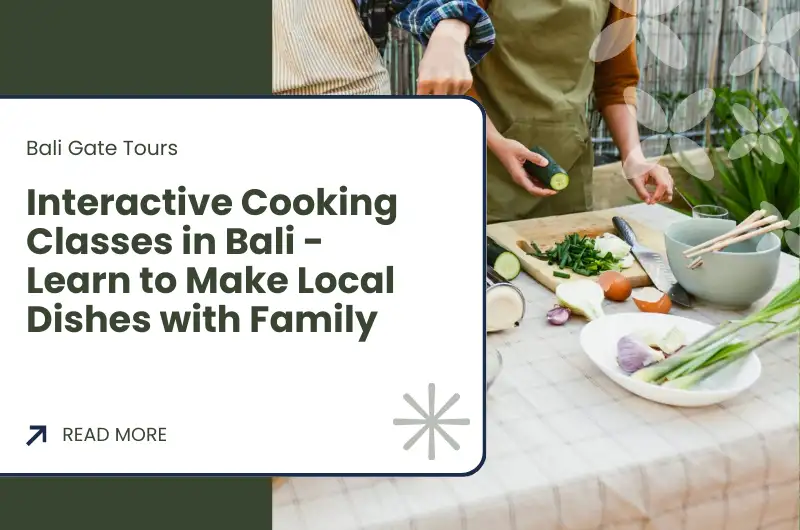Interactive Cooking Classes in Bali - Learn to Make Local Dishes with Family

Bali offers more than breathtaking beaches and vibrant cultural performances; it is also a culinary paradise waiting to be explored. For families seeking immersive and hands-on experiences, cooking classes Bali provide the perfect opportunity to engage with the island’s rich culinary traditions. These interactive sessions allow visitors to learn authentic recipes, discover local ingredients, and enjoy the process of creating meals together, making it an unforgettable family-friendly activity.
A typical interactive cooking Bali class begins with a guided visit to a traditional market. Here, families can explore stalls overflowing with colorful vegetables, fresh spices, aromatic herbs, and tropical fruits. Instructors explain the importance of each ingredient, sharing insights into Balinese culture and how local produce shapes the flavors of local dishes Bali. This market tour not only educates children and adults alike but also creates a deeper connection to the food they will prepare later in the day.
Once the ingredients are gathered, the real magic begins in the kitchen. Instructors guide participants step by step through the preparation of traditional recipes, from vibrant satays and rich curries to refreshing salads and unique desserts. For families, learning Balinese food together fosters teamwork, creativity, and hands-on engagement, turning cooking into an enjoyable and educational activity. Children often delight in mixing spices or shaping dumplings, while adults gain insight into the subtleties of Balinese flavor profiles.
What makes family-friendly activities Bali like cooking classes truly special is the interactive nature of the sessions. Unlike passive dining experiences, participants actively participate in every stage of meal creation. From chopping fresh herbs to simmering sauces, each step invites families to explore textures, aromas, and tastes, engaging all senses and creating lasting memories. This hands-on approach ensures that the experience is both educational and entertaining for visitors of all ages.
Bali’s cooking classes often emphasize cultural storytelling alongside culinary skills. Instructors share the history and significance behind each dish, explaining how recipes have been passed down through generations. Participants learn not only how to prepare interactive cooking Bali dishes but also why these foods hold a special place in Balinese ceremonies and daily life. This cultural immersion enriches the culinary experience, giving families a more meaningful understanding of the island they are visiting.
Another highlight of learning Balinese food is the use of locally sourced, sustainable ingredients. Many cooking schools prioritize organic vegetables, fresh seafood, and ethically raised meats, highlighting Bali’s commitment to sustainable gastronomy. Participants gain insights into ingredient selection, proper handling techniques, and balancing flavors, while also learning how conscious food choices support the environment and local communities. This adds an ethical dimension to the fun of cooking, making it a well-rounded family activity.
The social aspect of cooking classes Bali cannot be overstated. Families often work in small teams, collaborating on recipes, sharing tips, and celebrating small victories along the way. Children quickly learn how to cooperate and develop confidence as they contribute to the meal. Meanwhile, parents enjoy the satisfaction of passing on cooking skills and creating cherished family memories, transforming the kitchen into a space for bonding and joy.
For families traveling with children, family-friendly activities Bali cooking classes are designed to be safe and engaging. Kitchens are equipped to accommodate young learners, with age-appropriate utensils and step-by-step guidance that ensures everyone can participate without risk. Instructors encourage experimentation and creativity, allowing children to explore flavors and textures in a playful and educational setting, making the experience both fun and meaningful.
Beyond the hands-on cooking, many classes incorporate tasting sessions that bring the family together around the table. After preparing dishes such as Nasi Goreng, Sate Lilit, or Lawar, participants sit down to savor their creations. These shared meals offer the perfect opportunity to discuss the cooking process, appreciate the complexity of local dishes Bali, and enjoy a sense of accomplishment. It’s a rewarding experience that combines culinary education with the joy of family togetherness.
Some cooking classes even offer extensions into holistic experiences. Families can participate in additional activities such as traditional Balinese dance demonstrations, herbal garden tours, or visits to local farms. These complementary experiences enrich interactive cooking Bali, providing a broader perspective on Balinese culture, agriculture, and culinary traditions. This makes the day more than just a cooking session—it becomes an immersive exploration of Bali’s heritage and lifestyle.
The beauty of learning Balinese food through cooking classes is that it equips families with skills they can bring home. Recipes, techniques, and tips shared during the class encourage participants to recreate their favorite dishes long after returning from Bali. This lasting takeaway makes the experience educational, enjoyable, and deeply memorable, ensuring that the flavors and traditions of the island continue to be celebrated in the family kitchen at home.
In conclusion, interactive cooking Bali classes offer families an exceptional way to connect with Balinese culture, cuisine, and community. From vibrant market tours to hands-on meal preparation, from cultural storytelling to tasting sessions, these activities are designed to educate, entertain, and bring families closer together. By participating in family-friendly activities Bali like cooking classes, visitors enjoy a truly immersive, creative, and delicious journey into the heart of Bali’s culinary heritage, leaving them with cherished memories and a deeper appreciation for local dishes Bali.










